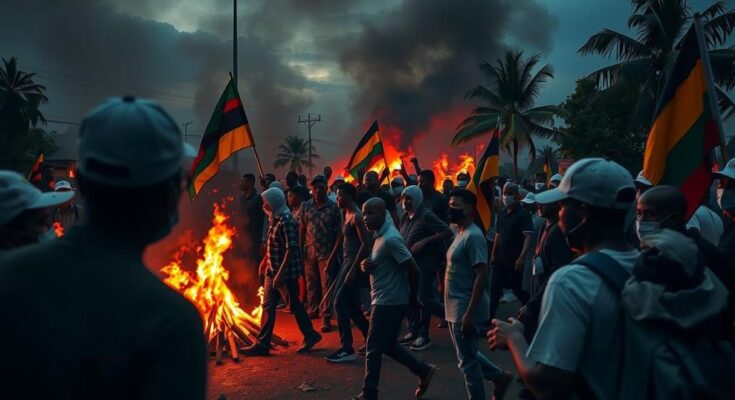Following a disputed election in Mozambique, deadly protests have occurred, with police accused of severe human rights violations. The unrest poses risks to regional stability, prompting SADC to schedule an emergency summit to address the crisis, which has severe implications on trade and human rights.
In Mozambique, post-election turmoil has erupted following the disputed election of October 9, resulting in accusations against police of executing twenty individuals while injuring hundreds during widespread demonstrations. The protests escalated after the ruling party, Frelimo, declared Daniel Chapo the victor amid allegations of electoral fraud. As violence escalates, fear has gripped opposition leaders, prompting some, like presidential candidate Venancio Mondlane, to flee the country. The Southern African Development Community (SADC) is now seeking solutions to this crisis, which threatens regional stability, particularly as vital economies depend on Mozambican ports for trade. An extraordinary summit will occur in Zimbabwe from November 16 to 20, focusing predominantly on Mozambique’s unrest. According to Adriano Nuvunga from the Centre for Democracy and Human Rights, the violence has led to a humanitarian crisis with alarming casualties and arbitrary detentions reported. Countries reliant on Mozambican ports for fuel and essential imports are already experiencing the impacts of the unrest. South Africa has closed its main port of entry to Mozambique due to safety concerns and is advising its citizens to refrain from non-essential travel. The ongoing crisis occurs concurrently with severe drought conditions affecting southern Africa, exacerbating hunger for millions in the region. Amnesty International has issued a strong condemnation, calling on both SADC and the African Union to respond decisively to prevent further human rights violations. They emphasize the urgency of halting the violence and ensuring accountability for those responsible for the recent bloodshed. Furthermore, human rights advocates are urging the Mozambican government to lift internet restrictions imposed upon election announcements, which inhibit citizens’ rights to information and peaceful assembly.
The situation in Mozambique follows a contentious election marked by allegations of corruption and electoral malpractice, leading to significant unrest. The Front for the Liberation of Mozambique (Frelimo) has been the ruling party since the country’s independence from Portugal in 1975. Long-standing issues, such as armed conflict, political repression, and regional instability due to drought and humanitarian crises, have compounded the challenges facing Mozambique and its neighbors. With ports critical to the economies of landlocked countries, the chaos that has erupted poses broader risks to regional development and stability.
The violent aftermath of Mozambique’s recent elections highlights deep-rooted political tensions and the dire consequences of unchecked state brutality. As the local and international communities call for urgent action, it is imperative that the Mozambican government reassesses its approach to governance and human rights to avert further escalation of violence and humanitarian crises in southern Africa. Continued engagement from regional organizations like SADC and advocacy groups will be crucial in navigating this complex landscape to foster stability and peace.
Original Source: www.theeastafrican.co.ke




